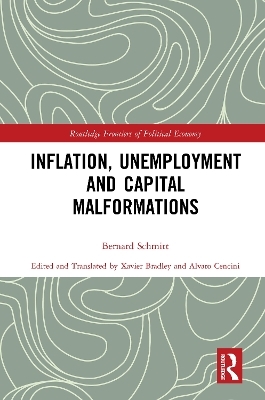
Inflation, Unemployment and Capital Malformations
Routledge (Verlag)
978-1-138-36980-1 (ISBN)
The volume deals with the main problems faced by capitalist economies, inflation and unemployment, in a new and original way, and provides the theoretical foundations for quantum macroeconomic analysis. Its aim is to allow English-speaking economists and interested readers to have a direct access to the analysis provided by Schmitt in his 1984 book Inflation, chômage et malformations du capital.
Orthodox economics has failed to provide a consistent insight of the pathologies hindering our economies, and both the academic and the economic worlds are much in need for an alternative approach capable to explain the origins of these pathologies and how they can eventually be disposed of. Schmitt’s volume provides a revolutionary explanation of the cause of today’s economic disorder as well as an innovative solution allowing for the passage from disorder to order. Neoclassical and Keynesian theories of any type are essentially based on equilibrium analysis and this is why none of them has ever been able to provide a consistent macroeconomic analysis based on macroeconomic foundations. This is what Schmitt’s book aims for: developing a new analysis built on identities rather than conditions of equilibrium, capable to explain the objective origins of inflation and unemployment.
In this volume, Schmitt introduces a new, revolutionary analysis centred on the concept of quantum time. The topics analysed by Schmitt cover the entire field of national macroeconomics, from production to capital accumulation, the leading role in this ground-breaking investigation being played by what he calls the theory of emissions. The ensuing macroeconomic theory is built on a set of laws derived from the monetary nature of our economic systems and defines the logical framework of inquiry into modern macroeconomics.
Bernard Schmitt was a full professor of Monetary Macroeconomics at the Universities of Burgundy (Dijon), France and of Fribourg, Switzerland. He was also the co-director of the Laboratory of Research in Monetary economics at the Centre for Banking Studies in Lugano, Switzerland. Among his main publications are: La formation du pouvoir d’achat, Monnaie, salaires et profits, Macroeconomic Theory, A Fundamental Revision, Théorie unitaire de la monnaie, nationale et internationale, La France souveraine de sa monnaie, External Debt Servicing. A Vicious Circle, and a number of contributions to collective books as well as papers published in peer-reviewed journals. English translation and introduction by Xavier Bradley, Université de Bourgogne, France. Alvaro Cencini, Università della Svizzera italiana, Switzerland.
Forward by Xavier Bradley and Alvaro Cencini
Forward by the Bernard Schmitt
GENERAL INTRODUCTION
Quantum time
Production and time
Expenditures and time
3.Production and expenditure constitute one unique event: the emission
PART I:THE FUNCTIONING OF THE DOMESTIC ECONOMY: FROM WAGES TO CAPITAL
From production to consumption: the creation and destruction of wages
Capital
PART II: THE DYSFUNCTION OF THE DOMESTIC ECONOMY: FROM CAPITAL TO CAPITALISM
The quantitative theory and the quantum theory of inflation
Inflation and unemployment have the same aetiology: empty emissions
The two benign cases of empty emissions or of inflation
It is precisely because fixed capital is the property of a non-person (the disembodied set of firms), that its amortization causes the malignant emissions
In most advanced capitalism, a third of the industries in the country issue empty wages
The malignant emissions and unemployment
PART III: THE REMEDIES USUALLY PROPOSED, THEIR INEFFICIENCY EVALUATED IN THE LIGHT OF THE THEORY OF EMISSIONS
Money does not circulate in the economy
Far from being independent from each other, global supply and demand are logically merged into one unique magnitude; only confusion in the mind can separate them
Inflation and unemployment are totally independent from the behaviour of economic agents
PART IV: THE SOLUTION IS IN THE DIVISION OF THE ACTIVITY OF BANKS IN THREE DEPARTMENTS. LIBERATED FROM EMPTY EMISSIONS, THE DOMESTIC ECONOMY FOLLOWS SAY’S LAW: IT ENSURES FULL EMPLOYMENT WITHOUT INFLATION
The division of banks in two departments
The economy equipped with a network of deposit banks all divided in three departments will be totally free from empty emissions
GENERAL CONCLUSION
The micro-macro distinction in economic analysis
Macroeconomics is the domain of absolute exchanges
Confrontation between the two paradigms: absolute exchanges, relative exchanges
The determination of wages
The circuit, macroeconomic concept par excellence, is the identity of income’s outflow and inflow
SYNOPSIS OF QUANTUM MACROECONOMICS
1. Production and time
2. Production and expenditures
3. Measurement in the economy and in economics
4. The creation of money
5. Capital
6. Inflation is a "malformation" of capital
7. At the core, inflation is caused by the systematic dysfunction of fixed capital’s amortization
8. Production of the second sector, inflation is defined in quantum time; its measure in continuous time does not let the magnitude of the disorder become apparent
9. Involuntary unemployment would necessarily be nil if the domestic economy did not include any dual production
10. Neither inflation nor unemployment would exist in an economy where all the monetary capital would transit through financial markets
Glossary of the Main Concepts
Afterword
Appendix
Afterword by Henri Guitton
Bibliography
Index
| Erscheinungsdatum | 25.06.2021 |
|---|---|
| Reihe/Serie | Routledge Frontiers of Political Economy |
| Übersetzer | Xavier Bradley, Alvaro Cencini |
| Zusatzinfo | 61 Line drawings, black and white; 61 Illustrations, black and white |
| Verlagsort | London |
| Sprache | englisch |
| Maße | 156 x 234 mm |
| Gewicht | 453 g |
| Themenwelt | Geschichte ► Teilgebiete der Geschichte ► Wirtschaftsgeschichte |
| Wirtschaft ► Allgemeines / Lexika | |
| Wirtschaft ► Volkswirtschaftslehre ► Wirtschaftspolitik | |
| ISBN-10 | 1-138-36980-2 / 1138369802 |
| ISBN-13 | 978-1-138-36980-1 / 9781138369801 |
| Zustand | Neuware |
| Informationen gemäß Produktsicherheitsverordnung (GPSR) | |
| Haben Sie eine Frage zum Produkt? |
aus dem Bereich


